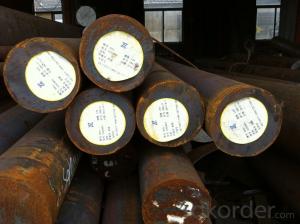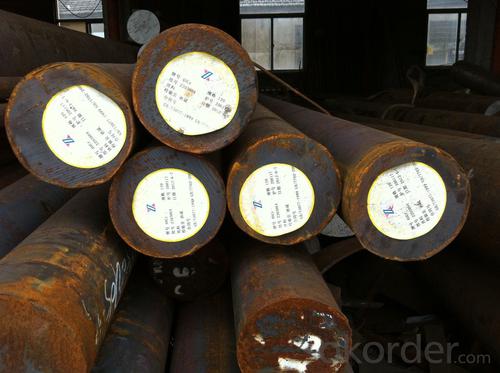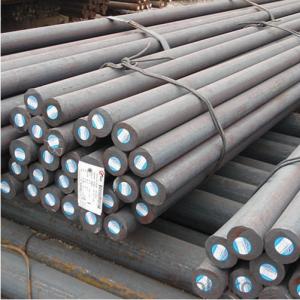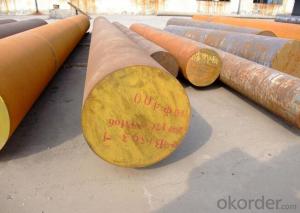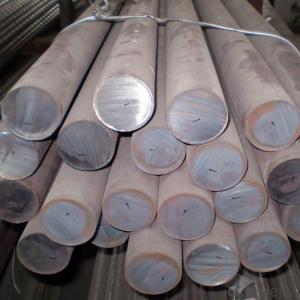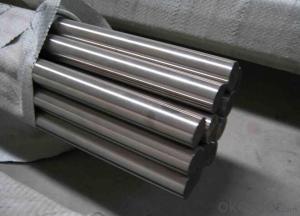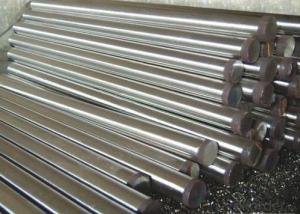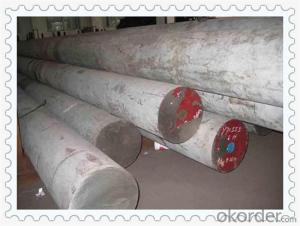Round Bar Alloy Tool Steel 42CrMo4 Special Steel
- Loading Port:
- China main port
- Payment Terms:
- TT OR LC
- Min Order Qty:
- 30 m.t.
- Supply Capability:
- 10000 m.t./month
OKorder Service Pledge
OKorder Financial Service
You Might Also Like
Specification
Characteristics
1) Even material.
2) Good machinability and polishability.
3) High toughness and high plasticity.
4) High abrasive resistance in high temperature.
5) Excellent total hardenability.
6) Low deformability during heat treatment.
7) Better isotropy.
Application
1) Diecasting mould(mold, fixed block, upper die, jet nozzle, nitride thimble ).
2) Extrusion die(mold, supporting member, choke blocks).
3) Hot press die. (aluminum, magnesium, copper alloy)
4) Parts, such as cold cutting, overlap, hot shears, wearable parts.
5) Important parts for aviation industry.
Product show
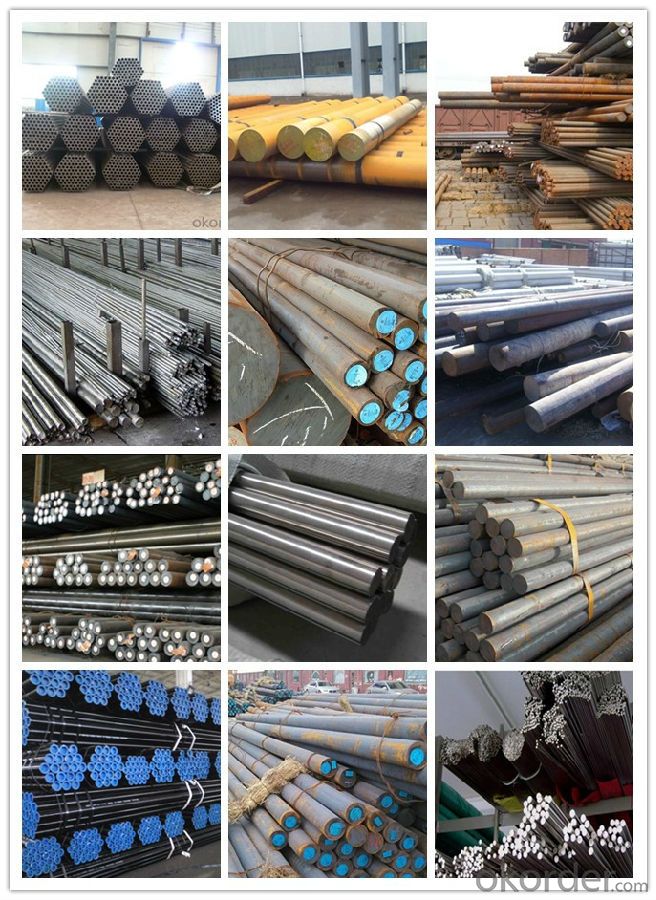
Workshop show
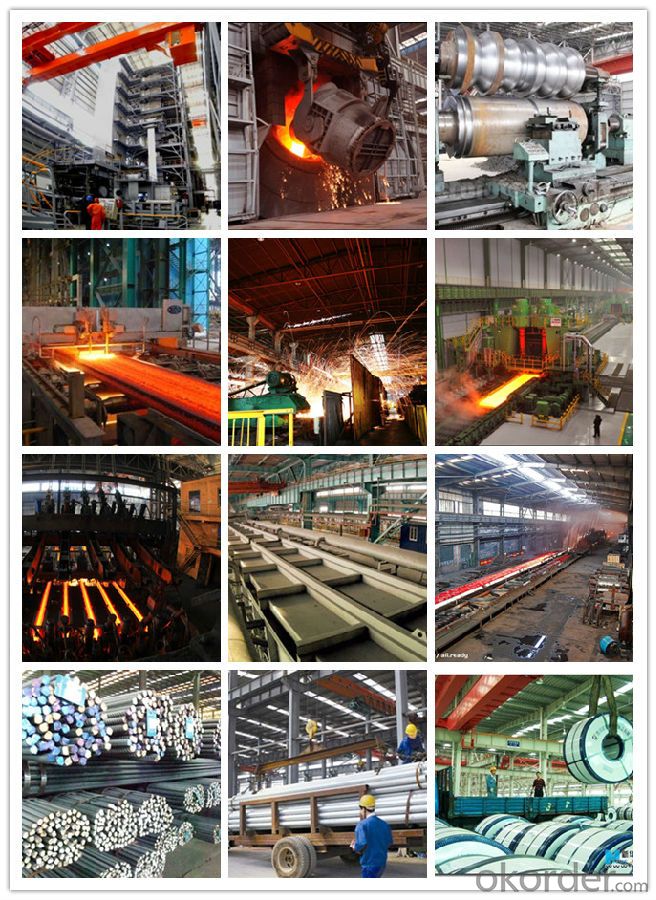
Shipping
1. FedEx/DHL/UPS/TNT for samples, Door-to-Door;
2. By Air or by Sea for batch goods, for FCL; Airport/ Port receiving;
3. Customers specifying freight forwarders or negotiable shipping methods!
Delivery Time: 3-7 days for samples; 5-25 days for batch goods.
Payment Terms
1.Payment: T/T, L/C, Western Union, MoneyGram,PayPal; 30% deposits; 70% balance before delivery.
2.MOQ: 1pcs
3.Warranty : 3 years
4.Package Informations: 1) EXPORT, In 20 feet (GW 25 ton) or 40 feet Container (GW 25 ton)
2)as customer's requirement
Main Product
Plastic Mould Steel
DIN 1.2311,1.2738,1.2083,1.2316 etc.
AISI P20,P20+Ni,420 etc.
JIS SUS420J2
Hot Work Steel
DIN 1.2344,1.2343,1.2367,1.2365,1.2581,1.2713 etc.
AISI H13,H11,H10,H21, etc.
JIS SKD61,SKD6,SKD5,SKT4 etc.
Cold Work Steel
DIN 1.2739, 1.2601, 1.2080, 1.2436, 1.2631, 1.263, 1.2510, 1.2327 etc.
AISI D2, D5, D3, D6, A8, A2, O1 etc.
JIS SKD10, SKD11, SKD1, SKS3 etc.
High Speed Steel
DIN 1.3343, 1.3243, 1.3247, 1.3355 etc.
AISI M2, M35, M42, T1 etc.
JIS SKH51, SKH35, SKH59, SKH2 etc.
Alloy Structural Steel
DIN 1.7035,1.6511,1.7220,1.7225 etc.
AISI 5140, 4340, 4135, 4140 etc.
JIS SCr440,SNCM439,SCM435,SCM440 etc.
Stainless & Carbon Steel or Others
DIN 1.4125,1.1191 etc
AISI 440C,1045, 1020 etc.
JIS SUS440C,S45C etc
Why choose us?
(1) The leading exporter in China special steel industry.
(2) Large stocks for various sizes, fast delivery date.
(3) Good business relationship with China famous factories.
(4) More than 7 years steel exporting experience.
(5) Good after-sales service guarantee.
- Q: What are the different methods of joining special steel?
- There are several methods of joining special steel, including welding, brazing, soldering, and mechanical fastening. Welding involves melting and fusing the steel pieces together using heat, while brazing and soldering use a filler metal with lower melting points to join the steel. Mechanical fastening methods, such as bolting or riveting, rely on physical connections to hold the steel pieces together without altering their properties. Each method has its own advantages and limitations, and the choice depends on factors such as the type of steel, the desired strength, and the specific application.
- Q: What are the factors to consider when selecting special steel for a specific application?
- When selecting special steel for a specific application, there are several important factors to consider: 1. Mechanical properties: The mechanical properties of the steel, such as strength, hardness, toughness, and ductility, are crucial in determining its suitability for a particular application. It is important to match the steel's mechanical properties to the specific requirements of the application to ensure optimal performance and safety. 2. Corrosion resistance: Depending on the application, it is essential to consider the steel's resistance to corrosion. Different environments, such as marine, chemical, or high-temperature conditions, may require specific corrosion-resistant alloys or coatings to ensure the longevity and reliability of the steel in service. 3. Temperature resistance: The ability of the steel to withstand high or low temperatures without losing its mechanical properties is crucial in many applications. Factors such as thermal expansion, thermal conductivity, and resistance to thermal fatigue must be considered to ensure the steel can perform effectively in the intended environment. 4. Weldability and fabricability: If the steel needs to be welded or fabricated into complex shapes, the ease of weldability and fabricability becomes an important factor. Some steels may require specialized welding techniques or preheating to avoid cracking or distortion during fabrication. 5. Cost: Cost is also a key consideration when selecting special steel for a specific application. It is important to balance the desired properties of the steel with the available budget to ensure cost-effectiveness without compromising performance or safety. 6. Availability: The availability of the chosen steel grade in the required form, size, and quantity is another critical factor. It is important to ensure that the selected steel can be easily sourced and obtained within the required timeframe to avoid project delays or cost overruns. 7. Compliance with standards and specifications: Depending on the industry or application, there may be specific standards, specifications, or regulations that the steel must comply with. It is essential to select a steel grade that meets these requirements to ensure compliance and maintain the necessary certifications or approvals. By considering these factors, engineers and manufacturers can make an informed decision when selecting special steel for a specific application, ensuring optimal performance, durability, and safety.
- Q: Can special steel be used in the renewable energy industry?
- Yes, special steel can be used in the renewable energy industry. Special steel offers high strength, corrosion resistance, and durability, making it suitable for various applications in renewable energy, such as wind turbines, solar panels, and hydroelectric power systems. It can withstand harsh environmental conditions and provide structural stability, contributing to the efficiency and longevity of renewable energy equipment.
- Q: How does special steel contribute to reducing product waste?
- Special steel contributes to reducing product waste by offering superior strength, durability, and corrosion resistance. This allows manufacturers to produce longer-lasting and more reliable products, minimizing the need for frequent replacements. Additionally, special steel's high precision and customization capabilities enable the creation of components with tight tolerances, reducing the risk of assembly errors and subsequent product failures. Consequently, special steel helps optimize product performance and longevity, thereby reducing waste generated from premature product disposal.
- Q: What are the properties of weathering steel?
- Weathering steel, also known as Corten steel, has several distinct properties. Firstly, it exhibits enhanced corrosion resistance due to the formation of a protective layer of rust on its surface, which prevents further corrosion and eliminates the need for painting. Secondly, weathering steel has a high tensile strength, making it suitable for structural applications. Additionally, it possesses excellent toughness and can withstand harsh environmental conditions, including extreme temperatures and high winds. Lastly, weathering steel has a unique appearance, with a rusty orange-brown color that blends well with natural landscapes.
- Q: What are the different tooling grades of special steel?
- Special steel, which possesses specific characteristics and properties, is a type of steel designed and manufactured for various industrial applications. Within this category, there are different tooling grades that have their own unique composition and properties. These grades are specifically engineered to meet the demands of different tooling applications, ensuring optimal performance and durability. There are several common tooling grades of special steel: 1. High-Speed Steel (HSS): HSS is a type of tool steel that has excellent hardness, wear resistance, and heat resistance. It is ideal for high-speed cutting tools like drills, milling cutters, and taps. Even at elevated temperatures, HSS retains its hardness, allowing it to maintain cutting performance without losing its edge. 2. Hot Work Tool Steel: This type of steel is designed to withstand high temperatures and thermal cycling in applications such as hot forging, die casting, and extrusion. It possesses good toughness, high heat resistance, and excellent wear resistance, which enable it to retain its strength and shape even under extreme thermal conditions. 3. Cold Work Tool Steel: Cold work tool steel is primarily used for cutting and forming applications at lower temperatures. It exhibits high hardness, toughness, and wear resistance, making it suitable for applications like blanking, shearing, and cold forming. Cold work tool steel maintains its hardness even under compressive forces, ensuring long-lasting performance. 4. Plastic Mold Steel: Specifically designed for the production of plastic injection molds and related tooling, this type of steel possesses excellent machinability, high polishability, and good wear resistance. It can withstand the demanding conditions encountered during plastic molding processes, ensuring precise and high-quality molding performance. 5. Powder Metallurgy (PM) Steel: PM steel is a tooling grade manufactured using a powder metallurgy process. This method allows for the production of complex shapes, uniform microstructure, and improved properties. PM steels are commonly used in high-performance cutting tools, wear-resistant parts, and high-strength applications. These examples represent just a fraction of the different tooling grades available in special steel. Each grade is carefully engineered to meet the specific requirements of various tooling applications, ensuring optimal performance, durability, and efficiency in different industrial sectors.
- Q: What are the properties of nitriding steel?
- Nitriding steel is a type of steel that undergoes a surface treatment process called nitriding. The main properties of nitriding steel include increased hardness, improved wear resistance, enhanced fatigue strength, and increased corrosion resistance. This is achieved by introducing nitrogen into the surface layer of the steel, forming a hard compound called nitrides. Nitriding steel also exhibits a low coefficient of friction, making it suitable for applications where sliding or rubbing contact occurs. Additionally, nitriding steel retains its core toughness and ductility, making it an ideal choice for components subjected to high-stress conditions.
- Q: What are the specific requirements for special steel used in the nuclear waste storage industry?
- The specific requirements for special steel used in the nuclear waste storage industry include high corrosion resistance to withstand the harsh and corrosive environment of nuclear waste, excellent mechanical properties to maintain structural integrity over long periods of time, low susceptibility to radiation-induced embrittlement, and the ability to retain its properties even at elevated temperatures. Additionally, the steel must meet stringent standards for radiation shielding and must be able to prevent the release of radioactive materials into the environment.
- Q: Can special steel be used for making nuclear industry components?
- Yes, special steel can be used for making nuclear industry components. Special steel, also known as stainless steel, possesses excellent corrosion resistance, high strength, and heat resistance properties, making it suitable for various applications in the nuclear industry. It is commonly used for manufacturing reactor vessels, steam generators, fuel cladding, and other critical components that require durability and reliability in nuclear power plants.
- Q: What are the main factors that affect the machinability of special steel?
- The machinability of special steel can be influenced by several factors. One of the main factors is the composition of the steel itself. Special steels often have complex alloys added to enhance their properties, such as increased strength or corrosion resistance. However, these alloying elements can also have a negative impact on machinability. Elements like chromium, nickel, and molybdenum can cause the steel to become more difficult to machine due to their hardening or abrasive properties. Another factor that affects machinability is the microstructure of the steel. Special steels can undergo various heat treatments to achieve desired properties, but these treatments can also change the microstructure of the material. For example, the presence of carbides or precipitates can make the steel harder and more brittle, leading to increased tool wear and poorer machinability. The hardness of the steel is another important factor. Harder steels generally have lower machinability as they are more resistant to cutting forces. High-speed steels, which are commonly used for machining, can be used to counteract this issue to some extent. However, excessively hard steels may require specialized tooling or machining techniques to achieve satisfactory results. The presence of impurities or non-metallic inclusions in the steel can also affect machinability. These impurities can disrupt the cutting process, leading to reduced tool life and surface finish. Special steel manufacturers often strive to minimize impurities and control inclusion content to improve machinability. Lastly, the cutting parameters and machining conditions play a significant role in determining machinability. Factors such as cutting speed, feed rate, and depth of cut need to be optimized to achieve the best balance between material removal rate and tool life. Coolant usage and chip evacuation are also crucial considerations to prevent excessive heat buildup and chip recutting, which can negatively impact machinability. In summary, the main factors that affect the machinability of special steel include composition, microstructure, hardness, impurities, and cutting parameters. Understanding these factors and applying appropriate machining techniques can help maximize productivity and achieve high-quality machined components from special steels.
Send your message to us
Round Bar Alloy Tool Steel 42CrMo4 Special Steel
- Loading Port:
- China main port
- Payment Terms:
- TT OR LC
- Min Order Qty:
- 30 m.t.
- Supply Capability:
- 10000 m.t./month
OKorder Service Pledge
OKorder Financial Service
Similar products
Hot products
Hot Searches
Related keywords
